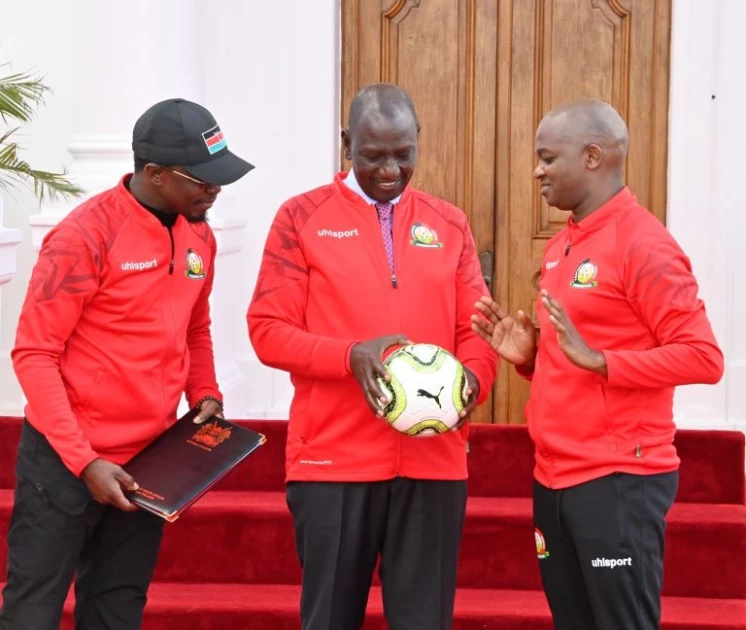The dire state of Kenyan football: Unraveling the crisis of sponsorship and governance

President William Ruto (C), Sports CS Ababu Namwamba (L) and FKF president Nick Mwendwa at the Nairobi State House on Monday 15th May, 2023 after he was briefed on Kenya's joint AFCON 2027 bid. Photo/ Courtesy of PPS.

Audio By Vocalize
As the
Kenyan football season for 2023/24 kicked off last weekend, it did so against a
backdrop of uncertainty and financial turmoil. What was once anticipated as a
season of revitalisation and progress, has taken a grim turn. With no title or
broadcast sponsors in sight, the Kenyan Premier League finds itself on the precipice
of financial insolvency.
Backtracking a few months ago after the end of last season, football lovers in the country were given a glimmer of hope after Sports Cabinet Secretary Ababu Namwamba talked up a "mega sponsorship package”, giving hope to the long suffering football fan.

However,
fast forward, the season has kicked off without a title sponsor leaving more
questions than answers. The absence of both title and broadcast sponsors paints
a grim picture for the league. With sponsorship being a cornerstone of modern
sports, the implications of this vacuum cannot be overstated. It leaves clubs
struggling to meet their financial obligations and casts a shadow over the
prospects of growth and development within the league.
The
financial stability of football clubs heavily rely on sponsorship deals. As the
season progresses without sponsors, clubs are faced with dwindling resources
and an uphill battle to meet their financial commitments, leaving the players
susceptible to manipulation.
The plight
of clubs like AFC Leopards and Gor Mahia, who have previously faced financial
turmoil, serves as a stark reminder of the challenges that lie ahead. The
dependency on government intervention, as witnessed in the past, is an
unsustainable solution, while the lack of a reliable sponsor also impacts
players' salaries and overall team morale, potentially leading to an exodus of
talent and a decline in performance.
Former vice
president of the Football Kenya Federation (FKF), Sam Shollei, had voiced his
apprehensions about the upcoming season. In an interview with our sister radio station,
Citizen, he said: “Without a sponsor, football standards will still go down.
Secondly, the money to pay players will be a challenge. You have seen what
happened to AFC Leopards recently and Gor Mahia; it was a problem until the
government had to intervene. The sponsor outside there is looking for value for
money."
The plight of players and referees is equally grim. Players, who are the lifeblood of the sport, find themselves uncertain about their future due to unpaid wages and financial instability within their clubs. This not only affects their personal lives but also hampers their performance on the field. Referees, who play a pivotal role in maintaining the integrity of the game, are left in a precarious position. With financial concerns and the lingering shadow of unpaid dues from the previous season, questions of impartiality arise, threatening the legitimacy of matches.

Luordvick
Aduda, former CEO of the FKF, pinpoints the governance of football as a major contributor
to the ongoing problems. Aduda expressed his concern, thus, "If the clubs
decide to commence the league, let them be prepared to go through what they
went through last time. It is even more sickening to realize that some of the
match officials are still talking about payments accrued from last season.
These are some of the aspects that contribute to the manipulation of
matches."
Former national
team coach Francis Kimanzi succinctly captured the crux of the matter: an
unattractive league is a less productive one.
"If a
league is not attractive, then it means it is less productive. Because for it
to be attractive, it has to be productive," said Kimanzi, shedding light
on the symbiotic relationship between the two factors.
Sam Shollei
also offered his perspective on the root causes of the problems, describing a
concerning scenario where those involved in the game are looking to profit from
different avenues, outside of the field itself.
"The
players are going to play in the field, but he himself has already kept a bet
outside there. He has gone to bet that there will be 4 corners. He will push
until those 4 corners come. There will be yellow cards. There are so many
contributors that have caused our sports to deteriorate in our country,"
Shollei said.
In the meantime, the league's appeal and viability hangs in the balance, dependent on finding a way to attract investments, maintain standards, and ensure the financial stability of the clubs.


Leave a Comment